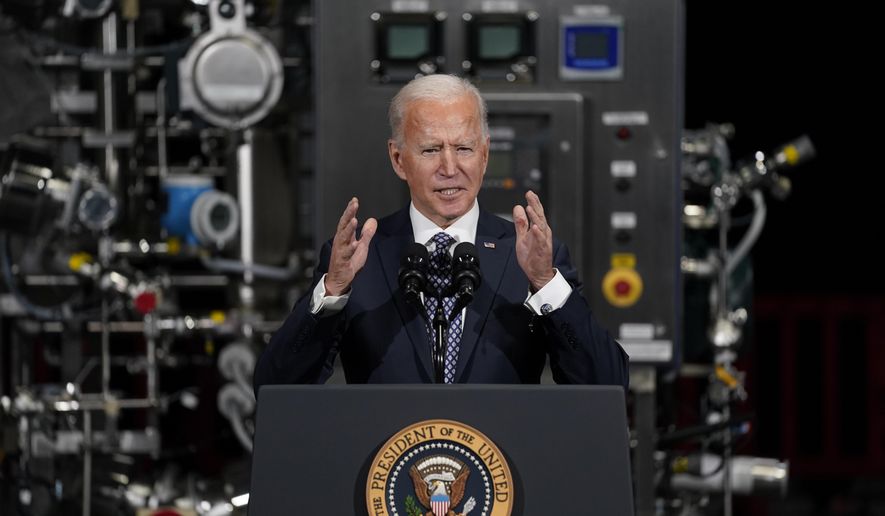President Biden plans to spend at least $2 trillion on infrastructure over the next four years, a proposal that will focus heavily on his goal of combating climate change through stricter environmental regulations, higher fuel-efficiency standards and limiting the expansion of fossil fuel production.
At his confirmation hearing last month, Transportation Secretary Pete Buttigieg told senators that the administration will use climate change policy to spur economic development.
Mr. Buttigieg said efforts to limit greenhouse gases will feature prominently in Mr. Biden’s plans to rebuild roads and bridges, expand mass transit and develop electric car infrastructure.
“We need to build our economy back, better than ever, and the Department of Transportation can play a central role in this, by implementing President Biden’s infrastructure vision — creating millions of good-paying jobs, revitalizing communities that have been left behind, enabling American small businesses, workers, families and farmers to compete and win in the global economy, and tackling the climate crisis,” Mr. Buttigieg said.
The administration is expected to announce the details of its plan next month, along with how to pay for it.
The president is promising to create 1 million new jobs in the U.S. auto industry, including development of half a million electric-vehicle charging stations; offering incentives to expand zero-emissions public transit; and using federal aid to upgrade railroads.
Money could be a hurdle. The infrastructure plan will come on the heels of Democrats’ $1.9 trillion COVID-19 relief bill, and mushrooming deficits because of the pandemic have prompted some lawmakers to call for Washington to put the brakes on spending.
Both the Obama and Trump administrations had grand plans for rebuilding infrastructure but failed to overcome partisan divisions in Congress and budget concerns.
The energy crisis in Texas during a severe winter storm this month also is renewing calls for the administration to upgrade the nation’s power grid, a perennial concern.
Republicans and some labor union leaders have questioned Mr. Biden’s commitment to rebuilding infrastructure, citing his early actions that included issuing an executive order to block the Keystone XL pipeline, which labor leaders say has cost thousands of jobs. The order said the U.S. must show leadership on the global climate change crisis by stopping projects that would add to greenhouse gas emissions.
At a meeting with union leaders at the White House last week, Mr. Biden said the nation is “so far behind the curve” on rebuilding its roads and bridges. He said the U.S. isn’t competitive enough “in terms of infrastructure, everything from canals to highways to airports, to everything we can do and we need to do to make ourselves competitive in the 21st century.”
“It’s time to stop talking about infrastructure and finally start building infrastructure,” Mr. Biden said. “Millions of good-paying jobs putting Americans to work rebuilding our roads, our bridges, our ports to make them more climate resilient, to make them faster, cheaper, cleaner to transport American-made goods across our country and around the world, that’s how we compete.”
Labor unions contributed at least $1.3 million to Mr. Biden’s election campaign last year, and he has pledged to be their ally.
Business leaders also have for increased spending on infrastructure. The U.S. Chamber of Commerce is pushing a campaign to get Congress to approve a plan by July 4. A coalition of more than 300 businesses urged Congress in a letter this month to make infrastructure a top priority.
Sen. Ben Cardin, Maryland Democrat and transportation subcommittee chairman on the Environment and Public Works Committee, has proposed using portions of the COVID relief bill funding as a starting point for an infrastructure plan. The pandemic relief measure includes aid for airlines, Amtrak, transit agencies and other infrastructure-related spending.
Also, the current federal surface transportation legislation expires in September. Some lawmakers are looking at a renewal — typically a five-year plan — as a vehicle to push through the administration’s overall infrastructure goals.
“A surface transportation reauthorization bill can reduce greenhouse gas emissions, create jobs to strengthen our economy and move us to a cleaner, safer future,” said Sen. Thomas Carper, Delaware Democrat. “I’m currently putting together a bipartisan bill that does just that, and I’m glad it’s at the top of the administration’s agenda.”
• Dave Boyer can be reached at dboyer@washingtontimes.com.




Please read our comment policy before commenting.